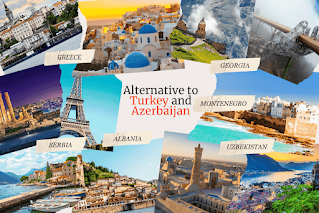Turkey, now joining Azerbaijan, India, Albania, Serbia, Montenegro, North Macedonia, and Georgia in the significant travel change influenced by the simplified Schengen visa programme organised by the European Union, marks a significant step in cross-border movement and tourism diplomacy. As the EU accelerates the provision of easier visa access to select non-member countries, these eight nations are enjoying quicker and more reliable entry into the Schengen area, benefiting from the resulting surge in travel demand, increased regional tourism activity, and a shift in Europe's strategy for engaging with international visitors.
Turkey Gains Easier Visa Access to Schengen Area
On July 15, Turkey officially became the newest country to achieve simplified entry into the Schengen Zone, due to a revised EU policy that simplifies multiple-entry visa applications for Turkish citizens. This development follows years of stalled negotiations on visa liberalization between Ankara and Brussels, with Turkish officials often criticizing the restrictive and complicated application process.
The new procedure now allows Turkish nationals with clean travel records to obtain long-term, multiple-entry visas with reduced bureaucracy. In 2024, Turkey submitted 1,173,917 Schengen visa applications, making it the second highest applicant after China. Of these, over 993,000 were granted, resulting in an approval rate of about 85%. The increase in applications—up 11.2% from 2023—demonstrates the importance of Schengen access for Turkish travellers, both for tourism and business.
India’s Cascade Visa Program Paves the Way
India was included in the EU’s visa simplification initiatives earlier this year, in April 2024, when the bloc launched a “cascade visa” system. Indian nationals can now obtain two-year and five-year multiple-entry Schengen visas if they have a history of compliant travel. The reaction from Indian travellers has been significant.
With 1,108,239 applications submitted in 2024—a 14.6% increase from last year—India is now among the top three countries applying for Schengen visas. However, the impact of visa denials remains substantial. An estimated ₹136 crore (around €15 million) was lost by Indian applicants due to over 165,000 rejections, with each visa costing about €85. Still, the program is alleviating reapplication worries, enhancing predictability, and creating greater opportunities for EU-India tourism and educational exchanges.
Azerbaijan and Georgia Enhance Travel Collaboration
Azerbaijan is also gaining from expedited visa processing through current facilitation agreements, recording 90,634 Schengen visa applications in 2024. Although it doesn't have visa-free travel yet, the process has become much quicker and more user-friendly, especially for frequent flyers and professionals.
On the other hand, Georgia already has visa-free access to the Schengen area for short visits, though its total number of specific visa applications is relatively low, estimated at under 4,000 annually. These benefits position both Caucasus countries as important links between Europe and Central Asia, strengthening strategic alliances and facilitating smoother exchanges among people.
Balkan Bloc Experiences Ongoing Access and Increased Tourism
Over the last decade, Albania, Serbia, Montenegro, and North Macedonia have enjoyed steadily improving visa access due to visa facilitation agreements and their closeness to EU markets. Although none of these countries ranked in the top ten for visa applications in 2024, it’s estimated that each submitted tens of thousands of applications, which has contributed significantly to increased regional mobility.
These Western Balkan nations benefit from simplified digital application systems, fewer documentation requirements, and faster processing times. As a result, there has been a noticeable rise in outbound tourism to EU countries like Italy, Austria, Slovenia, and Greece, particularly in the spring and summer months. New flight routes and expanded train services are turning European weekend trips into a growing reality for thousands of Balkan residents each month.
Travel Boom in the European Union
The European Travel Commission states that the surge in visitors from newly prioritized countries is significantly boosting regional tourism. In the first half of 2025, arrivals from Turkey, India, and the Balkans have increased by nearly 18% compared to the same time in 2024. Airports in Paris, Frankfurt, Amsterdam, and Vienna are experiencing higher incoming traffic, especially from Turkish and Indian tourists, leading several EU consulates to enhance their visa processing capabilities.
Popular spots like Spain, Italy, Greece, and Portugal are witnessing increased off-season bookings, notably from younger travellers and digital nomads, who now find Schengen entry much easier. The additional flexibility of multi-entry visas allows for extended, repeated stays—a major draw for business travellers, students, and freelancers from non-EU nations.
Why This Travel Change Matters
The European Union’s changing visa approach goes beyond just paperwork; it signals a significant shift in its global tourism and diplomatic focus. By simplifying Schengen access for eight strategically positioned countries, the EU is enhancing its soft power and providing a much-needed boost to its tourism sector after the pandemic.
The reduction of visa restrictions is generating momentum for greater trade, cultural exchanges, and regional collaboration. For nations like Turkey and India, this change rewards years of advocacy and paves the way for closer integration. For EU member countries, it’s a strategic move in tourism that helps fill hotels, increases air traffic, and rejuvenates cities reliant on international tourists.
Turkey now joins Azerbaijan, India, Albania, Serbia, Montenegro, North Macedonia, and Georgia in a significant travel change due to the European Union's implementation of easier Schengen visas. The EU aims to increase tourism, enhance diplomatic relations, and rejuvenate travel demand following the pandemic. This decision provides millions of travellers with easier access to Europe, resulting in a surge in visa applications and boosting regional tourism growth.
The Schengen Shift is Influencing the Future of Travel in Europe
From Istanbul to Mumbai and from Baku to Belgrade, travellers are entering Europe with reduced obstacles, decreased wait times, and greater assurance. This unified relaxation of Schengen visa regulations represents one of the most notable expansions in mobility we've seen lately—one that’s already yielding significant tourism benefits throughout the EU.
As visa lines diminish and tourism increases, the Schengen area is transforming from a selective group into a more welcoming and dynamic travel pathway—changing how Europe links with the world, one entry stamp after another.



